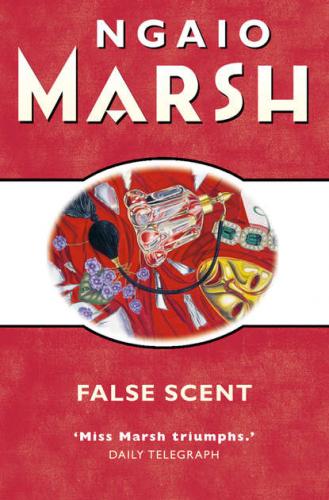NGAIO MARSH
False Scent
This novel is entirely a work of fiction. The names, characters and incidents portrayed in it are the work of the author’s imagination. Any resemblance to actual persons, living or dead, events or localities is entirely coincidental.
HarperFiction
HarperCollinsPublishers Ltd.
1 London Bridge Street
London SE1 9GF
First published in Great Britain by Collins 1960
Copyright © Ngaio Marsh Ltd 1960
Ngaio Marsh asserts the moral right to be identified as the author of this works
A catalogue copy of this book is available from the British Library
All rights reserved under International and Pan-American Copyright Conventions. By payment of the required fees, you have been granted the non-exclusive, non-transferable right to access and read the text of this ebook on-screen. No part of this text may be reproduced, transmitted, down-loaded, decompiled, reverse engineered, or stored in or introduced into any information storage and retrieval system, in any form or by any means, whether electronic or mechanical, now known or hereinafter invented, without the express written permission of HarperCollins ebooks
HarperCollinsPublishers has made every reasonable effort to ensure that any picture content and written content in this ebook has been included or removed in accordance the contractual and technological constraints in operation at the time of publication
Source ISBN: 9780006155904
Ebook Edition © OCTOBER 2009 ISBN: 9780007344765
Version: 2018-04-17
For Jemima with love
Contents
Copyright
Dedication
1 Pardoner’s Place – 9.00 a.m.
Also by the Author
About the Publisher
When she died it was as if all the love she had inspired in so many people suddenly blossomed. She had never, of course, realized how greatly she was loved, never known that she was to be carried by six young men who would ask to perform this last courtesy: to bear her on their strong shoulders, so gently and with such dedication.
Quite insignificant people were there: her Old Ninn, the family nurse, with a face like a boot, grimly crying. And Florence, her dresser, with a bunch of primroses because of all flowers they were the ones she had best loved to see on her make-up table. And George, the stage doorkeeper at the Unicorn, sober as sober and telling anyone who would listen to him that there, if you liked, had been a great lady. Pinky Cavendish in floods and Maurice, very Guardee, with a stiff upper lip. Crowds of people whom she herself would have scarcely remembered but upon whom, at some time, she had bestowed the gift of her charm.
All the Knights and Dames, of course, and The Management, and Timon Gantry, the great producer, who had so often directed her. Bertie Saracen who had created her dresses since the days when she was a bit-part actress and who had, indeed, risen to his present eminence in the wake of her mounting fame. But it was not for her fame that they had come to say goodbye to her. It was because, quite simply, they had loved her.
And Richard? Richard was there, white and withdrawn. And – this was an afterthought – and, of course, Charles.
Miss Bellamy paused, bogged down in her own fantasy. Enjoyable tears started from her eyes. She often indulged herself with plans for her funeral and she never failed to be moved by them. The only catch was the indisputable fact that she wouldn’t live to enjoy it. She would be, as it were, cheated of her own obsequies and she felt there was some injustice in this.
But perhaps, after all, she would know. Perhaps she would hover ambiguously over the whole show, employing her famous gift for making a party go without seeming to do anything about it. Perhaps – ? Feeling slightly uncomfortable, she reminded herself of her magnificent constitution and decided to think about something else.
There was plenty to think about. The new play. Her role: a fat part if ever she saw one. The long speech about keeping the old chin up and facing the future with a wry smile. Richard hadn’t put it quite like that and she did sometimes wish he would write more simply. Perhaps she would choose her moment and suggest to him that a few homely phrases would do the trick much more effectively than those rather involved, rather arid sentences that were so bloody difficult to memorize. What was wanted – the disreputable word ‘gimmick’ rose to the surface and was instantly slapped down – what was wanted, when all was said and done, was the cosy human touch: a vehicle for her particular genius. She believed in humanity. Perhaps this morning would be the right occasion to talk to Richard. He would, of course, be coming to wish her many happy returns. Her birthday! That had to be thought of selectively and with a certain amount of care. She must at all costs exclude that too easy little sum whose answer would provide her age. She had, quite literally and by dint of a yogi-like discipline, succeeded in forgetting it. Nobody else that mattered knew except Florence who was utterly discreet and Old Ninn who, one must face it, was getting a bit garrulous, especially when she’d taken her glass or two of port. Please God she wouldn’t forget herself this afternoon.
After all, it was how you felt and how you looked that mattered. She lifted her head from the pillows and turned it. There, across the room, she was, reflected in the tall glass above her dressing-table. Not bad, she thought, not half bad, even at that hour
